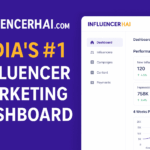In a nutshell, the answer to the question you posed at the start of this article is yes. Yes! Influencer Marketing Pay Off, and it is profitable and lucrative.
Influencer marketing is a booming trend in marketing, but does it work? Here, We’ll explore the benefits and drawbacks of working with influencers. We’ll also provide tips for choosing an influencer to help you reach your target audience.
Influencer marketing is a growing trend that has been gaining popularity over the past few years. Why? Because it’s effective and can help you reach your audience in a new way.
Influencers are well-known for their followers, which means they have a lot of people who trust them—and this can be useful for your business if you want to get more attention from potential customers or clients. But how much do influencers make from their work? Is it worth paying them? And what kind of business should use influencer marketing to get results quickly and easily?
While it’s true that all influencers are not equal, there are some general rules of thumb for assessing the quality of an influencer. First, the more followers an individual has and the higher up on Google’s rankings (or any other search engine) they appear, the better their influence will be.
If someone has a large following but doesn’t rank well in relevance or authority—or if their content isn’t properly optimized for maximum shareability—their value as an influencer is diminished.
Engagement Rates: The amount of time spent reading another person’s blog post or watching their video will tell you whether or not people like what they see and hear from these individuals at all levels.
Credibility: Credibility matters too! If someone doesn’t know what makes good content good (and even worse, if they think “good” means whatever comes out first). Then there might be no point in engaging with them since everything could quickly turn into trashy clickbait articles filled only with ads.
Influencers can help you establish thought leadership. Thought leaders are not necessarily experts in their field. They have a lot of knowledge and experience to share with others who may have yet to be exposed to the same information as they are.
Influencer marketing effectively allows brands or organizations to establish themselves as thought leaders within their industry by sharing helpful information with their followers on social media platforms such as Instagram or Twitter.
Brands also use traditional marketing channels to promote products and services, but they’re only sometimes the most effective way of engaging with your audience.
For example, suppose you’re selling a new product that your target audience might still need to learn about (and therefore won’t be interested in). In that case, it makes sense for your company to advertise on social media or on other websites where people will see it—but these places aren’t likely going to be as natural or organic as Instagram or YouTube.
An influencer who has built up trust with their followers will naturally want them to read about their latest hairstyle or travel adventures. It means that the content he shares will be more relevant than something from another brand’s ad campaign would have been.
Influencer marketing is a hot topic for every brand. Influencer marketing could be the perfect solution for your business if you want to target millennials and Generation Z.
A huge budget for an influencer campaign is optional. Brands can start their campaign with a pimping amount. But if you are interested in something other than creating content that has value beyond selling products or services, you might need a different strategy.
Who are Generation Z, Millennials, and Generation X:
